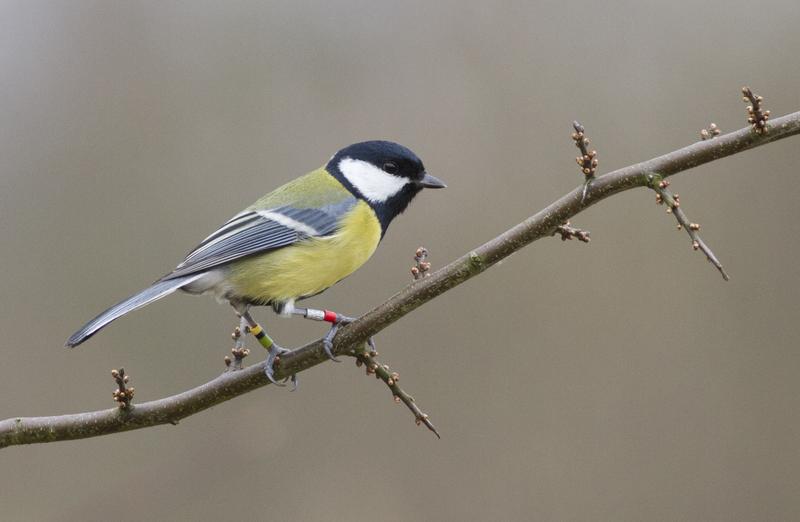

Great Tits have personality: They come as fast- and slow-explorers. Which type is more successful depends on the population density.
Richard Ubels
Exploratory behavior is a repeatable and heritable trait in West-European great tit populations and therefore underlies selection pressures in nature like all heritable differences in personality. Explorative individuals are more likely to take risks and to obtain higher social dominance ranks among territorial adults in the wild.
It might seem that those birds are doing better in competitive environments, such as in high densities, as they are better in defeating limited resources when intraspecific competition increases in a population. When competition is relaxed, net benefits may instead decrease because risky behaviors require more energy.
Researchers of the Max Planck Institute for Ornithology Seewiesen and the University of Groningen, however, followed another prediction: Fast-exploring, aggressive phenotypes may survive less well when facing high densities as they are less able to anticipate and buffer changes in their social environment.
For their study, the researchers regularly controlled 600 nest-boxes in 12 woodlots over four years and calculated the densities within and between the populations. Fitness was calculated as survival probability and number of recruits. Exploratory behavior was assayed in a “novel environment room” where the total number of flights and hops within the first two minutes after arrival of an animal was counted.
“The density effect on the different personality types was amazingly strong”, says Niels Dingemanse, research group leader in Seewiesen. Survival rates of fast explorers decreased with increasing density equally strongly as survival rates increased for slow explorers. These fluctuating selection pressures were mostly explained by year-to-year variation in density within rather than spatial variation among the 12 study plots.
Predicting the competition of next year
The design of the study did not only allow the researchers to understand how the different personality types underlie density dependent selection, but also if an individual is able do adjust its exploration behavior depending on the population density. „Our data show that great tits are able to anticipate future breeding densities as they are able to change their exploratory behavior between years“, says Marion Nicolaus, first author of the study.
In autumn, great tits may calculate the competition for breeding space in spring by the amount of beech seeds available: If there is a lot of food, chances to survive the winter are better. However, the birds were unable to appropriately adjust their exploratory behavior as they did not adaptively down-regulate their exploratory tendency with increasing density. According to the scientists, this explains why selection favors a mix of personality types rather than one single flexible type of individual.
Interestingly, psychologists also predict for human populations that competitive environments should favor sociable, shy, and non-aggressive individuals. In contrast, individuals with high levels of exploratory activity or aggression should perform relatively better in declining populations (e.g. because of habitat loss). “Whether this potential loss of personality variation affects the adaptive capacity of populations is currently unknown but represents an important question in both the social and natural sciences”, says Niels Dingemanse.
Publication:
Density fluctuations represent a key process maintaining personality variation in a wild passerine bird. Marion Nicolaus, Joost M. Tinbergen, Richard Ubels, Christiaan Both and Niels J. Dingemanse. Ecology Letters, Article first published online: 29 Feb 2016. DOI: 10.1111/ele.12584
Contakt:
Dr. Marion Nicolaus
Max Planck Institute for Ornithology
Research Group „Evolutionary Ecology of Variation“
E-Mail: mnicolaus@orn.mpg.de
Prof. Dr. Niels J. Dingemanse
Max Planck Institute for Ornithology
Research Group „Evolutionary Ecology of Variation“
E-Mail: ndingemanse@orn.mpg.de












